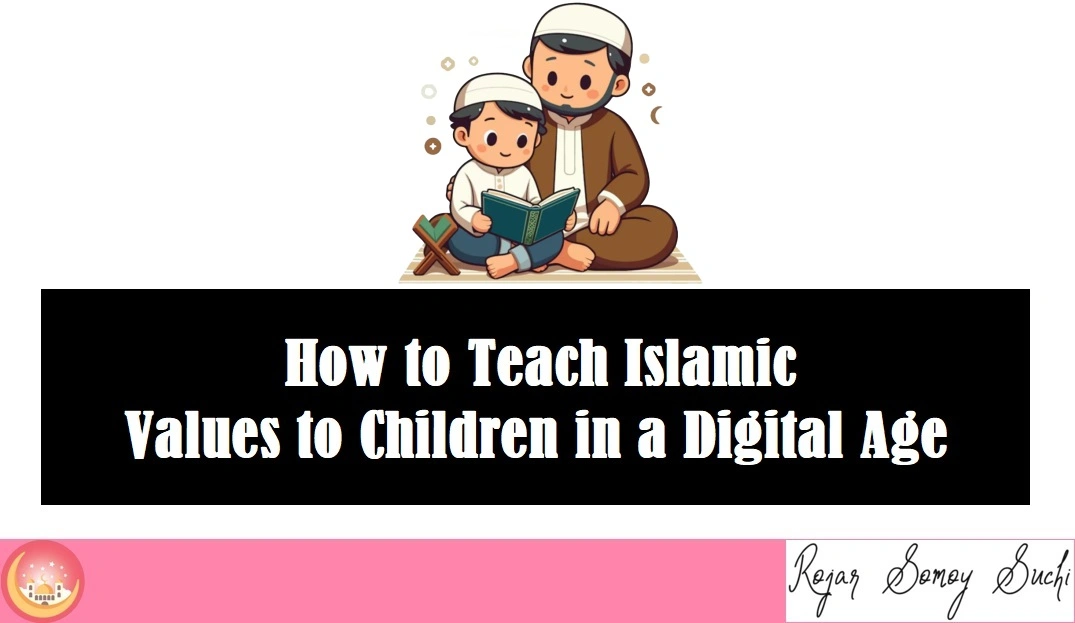
How to Teach Islamic Values to Children in a Digital Age: In today’s rapidly evolving digital landscape, raising children with strong Islamic values presents unique challenges and opportunities. The digital age, with its boundless connectivity and accessibility, can either serve as a tool for positive influence or become a source of distraction and misinformation. As parents and guardians, it is our responsibility to nurture an environment where Islamic teachings are seamlessly integrated into our children’s daily lives. By leveraging modern tools while staying grounded in timeless principles, we can instill values that guide our children both online and offline.
The Challenge of the Digital Age
The digital age has reshaped how children learn, socialize, and interact with the world. Platforms like social media, video streaming services, and online gaming expose children to diverse ideas, some of which may conflict with Islamic teachings. Moreover, the constant barrage of information can make it difficult for children to discern right from wrong, leading to confusion and misplaced priorities.
Yet, it is crucial to remember that technology itself is not inherently harmful. It is how we use it that determines its impact. With intentional strategies, parents can turn the digital world into a powerful ally in teaching Islamic values rather than a threat.
Building a Strong Foundation
Teaching Islamic values begins with building a strong foundation at home. Children often learn best by observing their parents. When they see their parents embodying values like honesty, patience, gratitude, and kindness, they are more likely to adopt these traits themselves.
Start by creating a routine centered around faith. For example, pray together as a family, recite and reflect on Quranic verses, and celebrate Islamic occasions with enthusiasm and meaning. These practices instill a sense of belonging and identity in children, giving them a moral compass to navigate the complexities of the digital world.
Encouraging Critical Thinking
One of the most effective ways to equip children for the digital age is to teach them critical thinking skills. Encourage them to question the content they consume and compare it against Islamic teachings. For example, if they come across a trend or behavior online, discuss it with them. Is it aligned with the values of honesty, modesty, and compassion? How does it impact their character or the way they treat others?
By fostering open dialogue, you create a safe space for children to share their thoughts and concerns. This not only strengthens your bond but also helps them develop the ability to make informed, value-based decisions.
How to Balance Deen and Dunya: Tips for a Faithful Life [Quran & Hadith]
Using Technology to Your Advantage
Technology, when used wisely, can be a powerful tool for teaching Islamic values. Numerous apps, websites, and online programs are designed to make learning about Islam engaging and interactive. For example:
- Islamic Educational Apps: Apps like “Muslim Pro,” “Quran for Kids,” or “Noorani Qaida” help children learn Quranic recitation, prayers, and Islamic history in a fun and accessible way.
- YouTube Channels: Many Islamic scholars and educators produce content tailored for young audiences, addressing topics like manners, the stories of the Prophets, and understanding the Quran.
- Interactive Games: Islamic-themed games teach children about core values while keeping them entertained. Games about charity, fasting, or even Islamic geography can reinforce lessons in an engaging format.
When introducing such resources, ensure they are age-appropriate and grounded in authentic Islamic teachings. Regularly monitor their digital consumption to avoid exposure to misleading or unverified content.
Setting Boundaries and Guidelines
To protect children from the potentially harmful aspects of the digital world, it is essential to set clear boundaries and guidelines. Here are some strategies:
- Establish Screen Time Limits: Balance is key. Allocate specific times for online activities and ensure they have ample time for physical play, family interaction, and religious practices.
- Monitor Content: Use parental controls to restrict access to inappropriate websites and apps. However, combine this with discussions about why certain content is unsuitable, empowering them to make good choices independently.
- Encourage Offline Activities: Promote hobbies and activities that align with Islamic values, such as volunteering, reading Islamic literature, or attending local mosque programs.
Teaching Through Stories
Children have an innate love for stories, and Islamic history is filled with rich, inspiring tales that teach valuable lessons. Share stories of the Prophets, the Sahabah (companions of the Prophet), and historical figures who exemplified courage, generosity, and unwavering faith.
For example, narrate how Prophet Muhammad (peace be upon him) treated everyone with kindness, including his adversaries, or how Umar ibn Al-Khattab (RA) upheld justice with humility. Such stories not only captivate children but also provide them with real-life examples to emulate.
Leading by Example
Children are highly observant. They are more likely to follow what you do than what you say. Reflect on your own relationship with technology. Are you modeling responsible usage? Are you prioritizing family time over screen time? Your actions set the tone for your household.
Additionally, demonstrate the values you want to teach. Show compassion in your interactions, express gratitude for blessings, and maintain honesty in all your dealings. When children see these values consistently practiced, they become ingrained in their character.
Building a Community
Surround your children with a supportive community that shares your values. Regularly engage with Islamic centers, mosques, or community groups where children can interact with peers who share similar beliefs. This provides a sense of belonging and reinforces the values taught at home.
Conclusion
Teaching Islamic values to children in a digital age is not without its challenges, but it is a journey worth undertaking. By building a strong foundation, encouraging critical thinking, leveraging technology, and leading by example, parents can raise children who are confident in their faith and equipped to navigate the complexities of the modern world.
In a time when distractions abound, the key lies in consistency and intentionality. As stewards of our children’s upbringing, let us embrace the tools at our disposal while staying anchored in the eternal teachings of Islam. By doing so, we ensure that our children grow into compassionate, ethical, and spiritually grounded individuals who carry the torch of Islamic values into the future.





